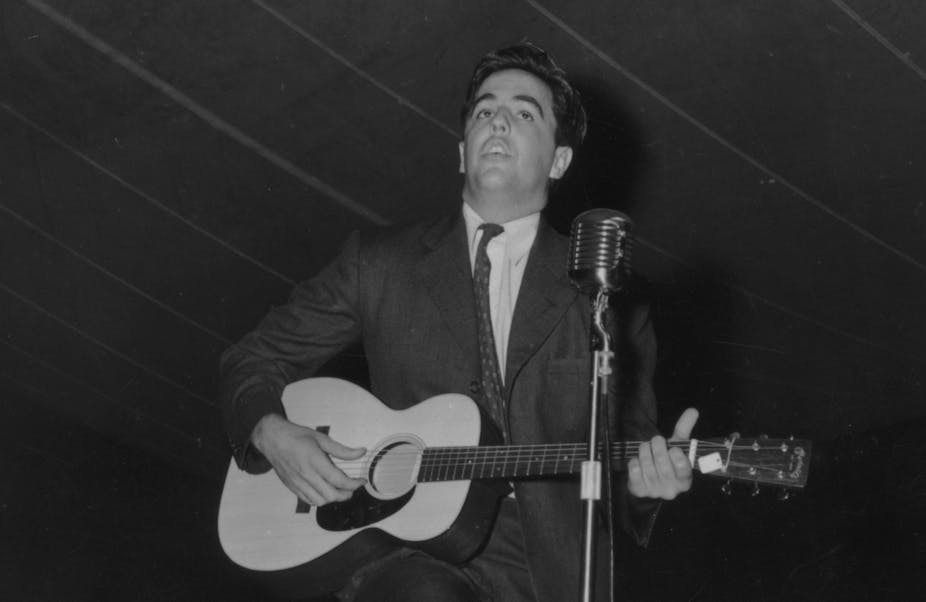If Alan Lomax were still alive, he would turn 100 Saturday. His name might not be as familiar as some other giants of folk music in the 20th century (such as Pete Seeger). But if you listen to folk or world music, use internet music streaming services, or just enjoy music from cultural traditions other than your own, you might owe Lomax a small debt of thanks.
A remarkable career
For around seven decades, from the 1930s through the 1990s, Lomax devoted his activities as a folklorist, musicologist, writer, producer and activist to promoting the understanding and appreciation of folk music.
Born in Austin, Texas, his career began as a teenager, when he worked alongside his folklorist father. When Lomax died in 2002 at age 87, the world lost one of its most tireless advocates for folk music.
Today Lomax is best known for his extensive audio and audiovisual recordings, many of them now publicly available. He is renowned for bringing fame to artists like Muddy Waters, Woody Guthrie, and Leadbelly.
But Lomax’s work extended well beyond his recording and documentation activities. Three other important contributions he made during his remarkable life, all with ongoing significance, are Cantometrics, the Global Jukebox, and his advocacy for cultural equity.
Cantometrics
Lomax and his colleagues developed their Cantometrics project in the 1960s. Using a complex scheme to attempt to classify music genres across the world, the project was nothing if not ambitious. Lomax hoped it would enable the creation of a global map of musics.
Since then, music researchers have largely discredited Cantometrics due to methodological and other concerns. Yet the project remains significant for questioning what we might learn about cultures, geographically and historically, by looking at patterns of musical styles.
Recently, some music researchers have called for a return to Lomax’s comparative methods. They argue we still have much to learn about music classification and mapping, the global spread of music styles, and the cultural and biological evolution of music. Lomax’s work provides a firm foundation for such research.
Global jukebox
Lomax devoted the last years of his life to a project even more ambitious than Cantometrics. This was the Global Jukebox, an interactive multimedia music database containing several thousand songs from around 400 cultures.
An updated and internet-compatible version of the Jukebox – the marvellously intriguing Global Jukebox Song Tree – is freely available online, still in beta mode.
The Global Jukebox was prescient. Similar music codification and classification systems are now being used by web-based music recommendation services such as Spotify and Pandora. In fact, Pandora’s vast Music Genome Project was partly modelled on Lomax’s methods and vision.
Cultural equity
Spanning the Cantometrics and Jukebox projects, and indeed much of his life work, was Lomax’s passion for “cultural equity”. He felt all cultures had a right to representation in the media and in education, and that no culture was inherently more worthy of attention than any other.
Lomax was troubled by the mass cultural “grey-out” he realised was occurring. In the early 1970s, decades before UNESCO’s 2003 Convention on the Urgent Safeguarding of Intangible Cultural Heritage, he summoned music researchers to action, writing: “We are impelled to a defense of the musics of the world”.

Over 40 years later, ethnomusicologists are heeding this call in earnest. Sustainable Futures for Music Cultures and other research and advocacy projects are now building on Lomax’s intellectual legacy to protect and promote more “vulnerable” music genres and cultures.
The legacy
The real value of Lomax’s work is perhaps only now becoming clear, more than a decade after his death. His tireless efforts to promote musical diversity and cultural equity continue in the Association for Cultural Equity, which he founded.
Music researchers continue to hotly debate the controversial Cantometrics project of the 1960s. Those who disagree with its detail, though, cannot fail to admire its ambition and humanistic vision.
As cultural organisations across the world campaign for culture to be included as a pillar of sustainable development in the UN Sustainable Development Agenda, and as we renew a collective commitment to a “sustainable, thriving and diverse musical life on our planet”, the spirit of Lomax is never far away.

